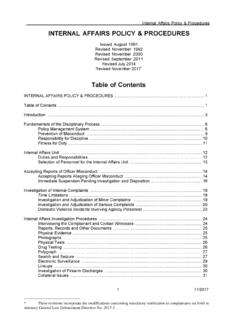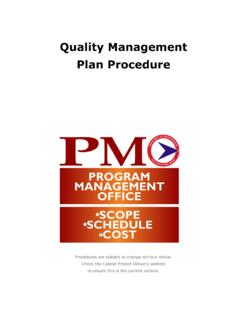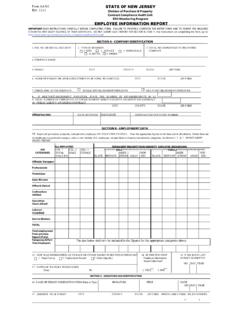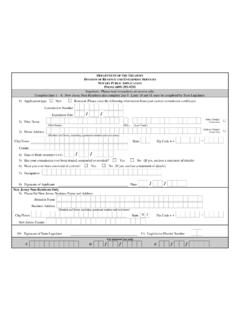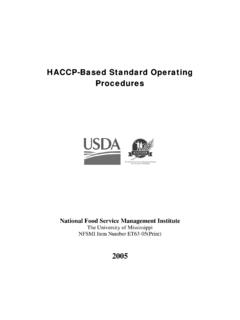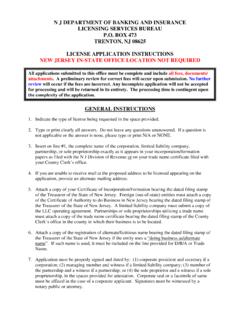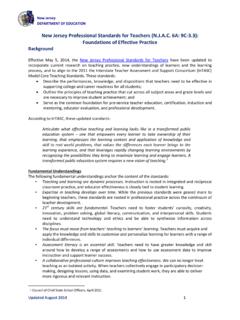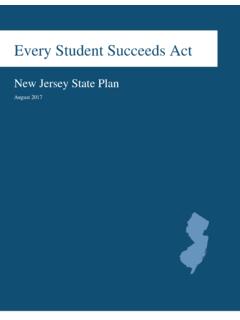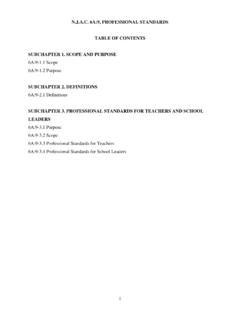Transcription of NJ Form O-10-C -General Information - Inheritance and ...
1 AMENDMENTS TO AN ORIGINAL RETURNFor all estates, any assets or liabilities not disclosed inthe original return should be reported in the form of asupplemental affidavit executed by the duly authorizedrepresentative of the estate, next of kin, or submitted should consist of a thorough but concisedescription of the items being reported, including the fairmarket value of each on the decedent's date of supplemental affidavit along with supporting docu-mentation should be forwarded to the Inheritance andEstate Tax REMINDERSWhen filing with the DivisionlIf the decedent died Testate (with a will) you mustsupply a legible copy of the WILL, plus any CODI-CILS (addendums to the will) and/or any SEPARATEWRITINGS which may affect the distribution of copy of the decedent's last full year's FEDERALINCOME TAX RETURN is returns, forms and correspondence must containthe required SOCIAL SECURITY ON ACCOUNT should be made to avoidthe accrual of CHECKS should be made payable to NJ Inheritance AND ESTATE TAX lSEND correspondence, checks and documents to: New Jersey Division of TaxationInheritance and Estate TaxPO Box 249 Trenton, NJ 08695-0249 GENERALINFORMATIONI nheritance and Estate TaxInheritance and Estate Tax BranchNew Jersey Division of Taxation50 Barrack Street 3rd FloorPO Box 249 Trenton, NJ 08695-0249 For additional Information call:(609) 292-5033(8:30 AM 4:30 PM, M F)or go Inheritance & Estate Tax O-10-C (01-17, R-13)INTRODUCTIONT ransfer Inheritance Tax is a beneficiary tax, and isbased on who specifically receives a decedent sassets, and how much each beneficiary received.
2 TheEstate Tax is based on the size of the entire estate, anddoes not break down the distribution of assets beyondexemptions for spouses and charities. In New Jersey,the Inheritance Tax is a credit against the Estate Tax;an estate pays only the higher of the Jersey has had an Inheritance Tax since 1892 when a5% tax was imposed on property transferred from adeceased person ("decedent") to a beneficiary. Currently,the law imposes a graduated Inheritance Tax ranging from11% to 16% on the transfer of real and personal propertywith an aggregate value of $500 or more to certain benefi-ciaries. New Jersey first enacted an Estate Tax in purpose was to ensure New Jersey receives the fullamount of the Credit for State Death Taxes allowed againstthe Federal Estate S NEW? 2016, c. 57 signed into law on Oct. 14, 2016, providesthat the New Jersey Estate Tax exemption will increasefrom $675,000 to $2 million for the estates of residentdecedents dying on or after January 1, 2017, but beforeJanuary 1, 2018.
3 For these estates, the New Jersey EstateTax no longer conforms to the provisions of the FederalInternal Revenue Code in effect on Dec. 31, 2001, andinstead follows the current Federal Internal Revenue Codefor determining the value of the estate which will be subjectto New Jersey Estate , no New Jersey Estate Tax will be imposed onthe estates of resident decedents dying on or after Jan. 1, , INSTRUCTIONSN ecessary forms and instructions concerning the procedureto be followed in completing an Inheritance Tax or EstateTax return may be obtained at or from the Inheritance andEstate Tax Branch in Trenton or downloaded from theDivision's web page at Inheritance TAX RETURNS ARE DUEAn Inheritance Tax return must be filed and the tax paid onthe transfer of real or personal property within eight monthsafter the date of a resident decedenta return must be filed for thetransfer of real or tangible personal property located in NewJersey and ALLintangible personal a nonresident decedenta return must be filed for thetransfer of real or tangible personal property located in NewJersey.
4 Though there is no direct tax on intangible assets( , bank accounts, stock, etc.), all such assets are used inthe calculation of the tax and must be reported on the return. For either a resident or nonresident decedenta returnmust be filed whenever any tax is due or when property ispassing to someone other than Class A beneficiaries. Thetax is a lien on all New Jersey property for 15 years from thedate of death unless the tax is paid before that time, or anacceptable bond is filed. Interest on unpaid tax will accrue atthe rate of 10% per annum beginning eight months after adecedent's date of death. The return should be filed directlywith the Inheritance and Estate Tax Branch in Trenton. BENEFICIARY CLASSES AND TAX RATEST here are four active Inheritance Tax beneficiary classes asfollows:lClass A Exempt from taxSpouse, Civil union partner after Feb. 19, 2007, Domestic partner after July 10, 2004, Child (includes legally adopted child) Grandchild, great-grandchild, etc.
5 , Parents, grandparents, etc., Mutually acknowledged child, Stepchild (but not step-grandchild or their issue). lClass B Eliminated by amendment July 1, CBrother or sister of a decedent, Spouse or surviving spouse of a child of a dece- dent ( , son-in-law or daughter-in-law),Civil union partner or surviving civil union partner of a child of a decedent (after Feb. 19, 2007).Rate for Each BeneficiaryFirst$25,000No taxNext$1,075,000@ 11%Next$300,000@ 13%Next$300,000@ 14%Over$1,700,000@ 16%lClass D Every other transferee, distributee or beneficiary not classified as A, C, or E. Rate for Each BeneficiaryFirst$700,000@ 15%Over$700,000@ 16%lClass E Exempt from taxIncluding but not limited to:Qualified charities (generally 501(c)3), Religious institutions, Educational and medical institutions, Non-profit benevolent or scientific institutions, The State of New Jersey or any of its political sub- addition to the exemptions listed under "BeneficiaryClasses and Tax Rates," no Inheritance Tax is imposed on.
6 LTransfers to a beneficiary having an aggregate value of less than $ insurance proceeds paid to a named from the New Jersey Public EmployeesRetirement system , the New Jersey Teachers' Pensionand Annuity Fund, and the New Jersey Police andFiremen's Retirement Civil Service Retirement benefits payable to a beneficiary other than the estate or the executor or administrator of a decedent's payable by the Government pursuant tothe Retired Serviceman s Family Protection Plan or theSurvivor Benefit Plan to a Beneficiary other than theestate or the executor or administrator of a TAXIn addition to the Inheritance Tax, the State of New Jerseyimposes an Estate Tax on the estates of certain residentdecedents. (There is no Estate Tax assessed against non-resident decedent s estates.) Even estates that are partial-ly or fully exempt from Inheritance Tax may be subject tothe New Jersey Estate Tax. NOTE: A number of assetsthat are not reportable for Inheritance Tax are included inthe gross estate for Estate Tax, most notably life insurancepaid to a named beneficiary and non-NJ real estate.
7 For decedents dying after Dec. 31, 2001, but beforeJan. 1, 2017 The New Jersey Estate Tax is an amount equal to the cred-it for State death taxes allowed under Federal Estate Taxlaw, less that portion of the credit which is attributable toproperty located outside New Jersey, and less any NewJersey Inheritance Tax. The credit allowable is calculated in accordance with theprovisions of the Internal Revenue Code in effect on , 2001. A 2001 Federal Form 706 must be completed inaccordance with the provisions of the Internal RevenueCode in affect on Dec. 31, 2001. Although the 2001 Internal Revenue Code did not permit amarital deduction for property passing to a surviving civilunion partner, such a deduction is permitted for NewJersey Estate Tax purposes for decedents dying on or afterFeb. 19, 2007. In these cases, the 2001 Form 706 shouldbe completed as though the Internal Revenue Code treateda surviving civil union partner and a surviving spouse in thesame an alternative to filing a completed 2001 Form 706, anestate may, in many cases, use the Simplified Method tocompute the New Jersey Estate Tax.
8 This method is basedupon the net estate as determined for the New JerseyInheritance Tax, with certain adjustments. The SimplifiedMethod is not intended for use in all estates. It may not beused if an estate files, or is required to file, a Federal EstateTax return (Form 706) with the IRS, or if its use does notproduce a tax liability similar to that produced using the 2001 Federal Form 706. This method permits a marital deductiononly for property passing outright to a surviving spouse or toa surviving civil union partner on, or after, Feb. 19, 2007. For decedents dying on or after Jan. 1, 2017, but beforeJan. 1, 2018 The Estate Tax is calculated on the amount of the taxableestate pursuant to the current Internal Revenue Code, usinga progressive rate schedule with rates ranging from 0% to16%. Credits against the Tax will include: the portion of thetax attributable to property located outside New Jersey, anyNew Jersey Inheritance Tax, and a credit equal to the taxdue on the $2 million exclusion amount ($99,600).
9 A completed current Federal Form 706 must be submittedalong with the New Jersey Estate Tax Return whether or notthe estate is subject to Federal Estate decedents dying on or after Jan. 1, 2018 There is no New Jersey Estate Tax imposed on the estatesof resident decedents dying on or after Jan. 1, 2018. Thisprovision does not affect the New Jersey Inheritance Tax,which remains in force. FEDERAL ESTATE TAX RETURNThe law requires that a copy of the Federal Estate Tax returnbe filed with the Division within 30 days after the filing of theoriginal with the federal government. Also, a copy of anycommunication from the Federal Government making anyfinal change in the return, or confirming, increasing, orreducing the tax shown to be due must be filed with theDivision within 30 days of receipt. Inheritance AND ESTATE TAX WAIVERSC ertain property in the name of or belonging to a decedentcannot be transferred without the written consent of theDirector, Division of Taxation.
10 This consent, commonlyknown as a "waiver," will not be granted until any tax duehas been paid or provided for. A. PERSONAL PROPERTY RESIDENT DECEDENTS1. Waivers are not required for automobiles or othervehicles, household goods, accrued wages, or mort-gages, but these assets must be reported in the taxreturn(s) filed. 2. A membership certificate or stock in a cooperativehousing corporation held in the name of a decedent anda surviving spouse, civil union partner or domestic part-ner as joint tenants with right of survivorship is exemptfrom the Inheritance Tax. However, a waiver is requiredto transfer ownership to the Banks, savings and loan associations, and otherfinancial institutions may release 50% of all funds ondeposit with them to the proper party prior to theissuance of a waiver. The full amount on deposit as ofdate of death of decedent must be listed in the taxreturn(s) and will eventually require a waiver.
